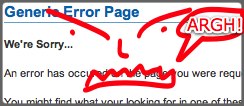A few months ago, I was forced to decide what new blogging software to use on this site, and eventually settled on Movable Type 5, to the puzzlement of many of my geek friends. Why puzzlement? Well, here's what I wrote at the time:
Movable Type's day in the sun may be past. While some high-profile sites of people I know—such as John Gruber and Dave Shea—use it, its popularity seems to have been in general decline since the licensing controversies of version 3, way back in 2004. The current version 5 (MT5) is brand new, and an open source project, but I don't sense the same community vibrancy and wealth of third-party extensions WordPress has. Six Apart, the company that created Movable Type, also seems to have been focused on its other hosted blogging tools, TypePad and Vox, for years. [...]
I know there are lots of people who love it, but I just get the sense that general enthusiasm for Movable Type has faded—even in the vibe I feel after installing and playing around with MT5 last night. The basic software is great, mature, and solid. But when I want to muck around and extend it, the available resources are a little sparse and often out of date.
Not exactly enthusiastic, was I? And if I was going to move to Movable Type, why hadn't I done so five or six years ago, when it was still cool? But then I actually tried using it, and comparing it to the main alternative (and favourite of the cool kids today), WordPress, with which I've been familiar for several years:
I'm warming to the way Movable Type works. It's taken only a little effort to customize it, roughly to match my existing page design and typography here—easier than I've experienced with WordPress.
I went with Movable Type in the end, and have not regretted it. It behaves the way I want, and I've found it intuitive and simple to customize to my liking, despite some aspects (version upgrades and plugin availability, most notably) where WordPress is unquestionably better.
A worrying merger?
So I was a bit nervous when Six Apart, the company that created and supports Movable Type, sold itself to web advertising firm VideoEgg this week to form a new company, SAY Media (or Say Media—they've been a bit inconsistent in how that's supposed to be capitalized). It's not clear what role Movable Type will play in this new company.
There's nothing inherently destabilizing in a software company being sold, acquired, or merged. Pyra Labs, which created Blogger, my former publishing platform, certainly gained stability when bought by Google in 2003. And Six Apart itself hasn't been the most reliable home for its bloggers, sowing confusion with Movable Type 3's controversial licensing changes back in 2004, buying and then selling LiveJournal, and most recently shutting down Vox entirely. The licensing situation of Movable Type remains a little confusing.
So maybe SAY Media will clear some of that confusion up, get Movable Type Enterprise updated to version 5 for those who use it, and do other things people have been waiting for. Or maybe not.
UPDATE: As of November 2010, the SAY Media–Six Apart merger is officially complete, with Ben Trott, one of the two people who created Movable Type years ago, as Chief Technical Officer (CTO) for the combined company. The Movable Type software has also seen a few minor updates, so that's at least a bit encouraging.
Buzzword compliant
The early days of the merger haven't been encouraging for Movable Type users:
- The initial announcement mentions TypePad, but not Movable Type at all.
- Movable Type appears only as a link at the bottom of the new company's home page.
- Even on Movable Type's own site, the blog post about the merger doesn't mention the product.
And for a personal blogger, writer, and editor like me, the most disturbing stuff is a sentence like this, from the merger press release:
Through the creation of social hubs and influencer-driven custom content programs linked to the innovative AdFrames offering, SAY Media delivers engagement across display and mobile.
Uh, what?
Does that mean anything? Especially for someone who just wants to write and publish a clear and useful website? To me, the accompanying video doesn't clarify, and with all the talk about helping "creators" or "influencers" or whatever we're supposed to be called, seems mostly focused on advertising. Which is fine for the company, if the people who work there can tolerate speaking such buzzword-laden gobbledegook.
But I'm not going anywhere, yet
I still like Movable Type, and was pleased to see a bug-fix version 5.03 appear earlier this month. Maybe SAY Media will do well by the software, or might sell it to some other firm that will. The open-source version, and the fork at Melody, will presumably remain in some form, and the option to move over to WordPress or another platform remains open, since I still control all my data.
I'm not planning on making any rash changes so soon after moving to Movable Type in the first place, but I'm keeping my eyes open to see if SAY Media drops the ball. I expect the rest of the Movable Type user community is too. Don't screw us over, guys.


 While my wife and I have had the occasional difficulty with it over the years, I like our credit union,
While my wife and I have had the occasional difficulty with it over the years, I like our credit union, 


